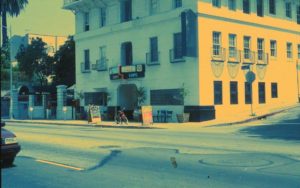[This piece first appeared in LA Taco on June 28, 2017 ]
The origins of radical food in Los Angeles
When Jonathan Gold named Locol the LA Times “restaurant of the year,” he emphasized its commitment to serving the people of Watts, where it is located. It offers them inexpensive-but-healthy food as well as job opportunities in an environment that is as hip and multicultural as Los Angeles itself. Gold lauded Daniel Patterson and local hero Roy Choi, the two culinary luminaries who started the restaurant, for their sense of social purpose and commitment to changing the landscape.
 What Gold did not say is that Los Angeles has a long and fascinating history of socially engaged eateries and that some of them are far more radical than Locol. Consider the Luna Sol Café, which operated near MacArthur Park from 1996 to 2003. It provided low-cost, nutritious fare and had deep roots in the multi-ethnic, underground scene of its time, but, crucially, it was a worker-owned cooperative, in which responsibilities and privileges were shared in a horizontal, egalitarian way. It is the only restaurant of this type that LA has known and one of very few in California’s history.
What Gold did not say is that Los Angeles has a long and fascinating history of socially engaged eateries and that some of them are far more radical than Locol. Consider the Luna Sol Café, which operated near MacArthur Park from 1996 to 2003. It provided low-cost, nutritious fare and had deep roots in the multi-ethnic, underground scene of its time, but, crucially, it was a worker-owned cooperative, in which responsibilities and privileges were shared in a horizontal, egalitarian way. It is the only restaurant of this type that LA has known and one of very few in California’s history.
From Occupation to Full-Blown Restaurant
Luna Sol emerged at a moment when the credibility of the city’s establishment had reached new lows, and many felt that it was necessary to rebuild society from the ground up. Everyone had seen LA’s Black and Brown masses turn the world upside down during the 1992 rebellion, forcing themselves into the discussion, and many had watched with frustration as politicians responded to this with bogus promises, plans, and programs. There was sort of a running battle between the old guard and the newly energized forces of change. For example, the LA Conservation Corps ran a youth-oriented jobs program that treated the kids like cattle; in response, the youth seized the program’s building in 1995 and transformed it into an activist hub known as the Peace and Justice Center. Continue reading
